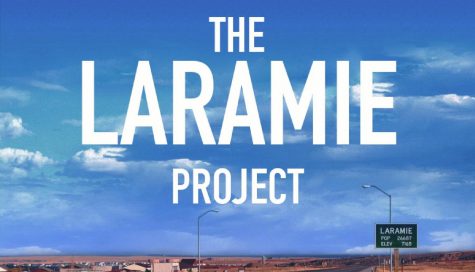The Laramie Project: BeDrama’s Decision to Combat Hate
“I have always said that theatre should either entertain or enlighten and make change,” Berkley drama teacher Mr. Hopkins explained, “It’s not just so we have a smile on our face and clap and leave. It’s for the purpose of changing minds or making people think a little bit more.” On November 17-19, Berkley High School is doing just this by putting on a production of “The Laramie Project.” “The Laramie Project” is a play created by Moisés Kaufman and other members of the Tectonic Theatre Project. This play is the true story of one of the most notorious anti-gay hate crimes, which took place in 1998 in Laramie, Wyoming. Matthew Shepard, a 21-year-old gay man attending the University of Wyoming, was abducted, tied to a fence, and severely beaten by 22-year-old Aaron McKinney and 21-year-old Russell Henderson. He was left there in the freezing cold, and although he was found and eventually taken to a hospital, he died five days later. “The Laramie Project” focuses on the community’s response to this hate crime. Kaufman explained that through a series of interviews of the town citizens, the Tectonic Theatre Project “began to hear a rich and varied collection of community voices,”; In this average town, responses to this hate crime ranged from compassionate to purely hateful.
“The Laramie Project” is verbatim theatre: a form of theater based on real words from real people in order to present an event from the multiple perspectives that exist surrounding it. The power of this play lies in the fact that everything the audience hears is drawn from primary interviews, journal entries, and news reports. The people in this play, good or bad, are portrayed by their own words. So, in this town where a tragedy happened, we saw the real people and the real dialogue which surrounded–and contributed to–the murder of Shepard. In the play, again and again, the townspeople explain they don’t necessarily hate gay people, they just don’t want them in their faces; their mantra is “Live and let live.” And although they pretend to tolerate the lifestyle of Shepard and others, the townspeople really do anything but this. Senior Josh Bianca, who plays four characters in the play, explains, “This play exposes these people who claim ‘We are not that bad here.’ and it’s like yes, you are. They say, ‘We don’t make those kinds of kids here who murder people out of hat.e’ but it’s like, no, you do.”
One reality that this play reveals is that people’s words matter. Although some may feel they aren’t being directly offensive and biased, if that is their mindset, it will shine through. The people of Laramie, Wyoming, never directly said “I hate gay people,” but their prejudices were easy to spot, and the effects were tragic. Bianca explains, “I hope that people realize that the environment that they create matters. And that if you build a foundation for hate, younger generations are going to learn that. All of this behavior is learned. People hate because they have seen people hate. If no one takes the time to create a positive environment or a space where children learn to accept everyone, then the whole cycle of this hate is going to continue.” It is not about mere tolerance but about true acceptance.
Although Shepard was murdered 24 years ago, anti-LGBTQ+ hate crimes are still very common. About a month ago, on November 19, 2022, there was a shooting at an LGBTQ+ nightclub; five people were killed, and 25 were injured. Stonewall stated that two-thirds of LGBTQ+ people have experienced anti-LGBTQ+ violence and abuse. Further, in Laramie, we see the dominance of the oppressive Christian church and religion in the town, and this dominance is seen everywhere in the world. Opposing discriminatory religious beliefs in communities often increases hate and shame, especially to LGBTQ+ groups. Religious groups claim that their word–and scripture–is God’s; How can people argue with beliefs, as prejudiced as they may be, if they are said to come from God? But regardless of the claimed source, love should always trump hate, and we must actively work to stop LGBTQ+ violence.

This is why it was so important that “The Laramie Project” was Berkley’s play this year. As Mr. Hopkins put it, “I am hoping that if somebody’s grandpa or somebody’s dad comes to see the show and they have been less than supportive to any marginalized population, that it will make them think, ‘Hey, wait a second. I am part of a system, and the system I am in could cause this’”. When Mr. Hopkins refers to “this,” he is referring to acts like the hate crime on Shepard. Mr. Hopkins hopes people, after seeing the play, will think, “‘I want to change the system I am in.’” Right now, there is so much polarity politically in our world. There is a clear divide between people, and everyone seems stuck in their own echo chambers. We talk to people who have the same opinions as us and curse those who don’t. This is exactly why it is important that we take note of this and step out of our echo chambers. Not only can we spread information and facts to others, but we can all learn something.
When I asked Mr. Hopkins what students should look out for in this play, he answered “themselves.” The biggest takeaway of this play is how we can and should foster a safer environment for the LGBTQ+ community. The key to doing this is looking at our implicit biases. Mr. Hopkins explained, “I hope that our audiences look out for themselves. I hope that they look at the world around them and think, ‘I have a bigger part in this than I thought and can do more.’” Even if we feel our actions don’t have a big ripple effect, oftentimes, they do. We must recognize our biases and actively fight against them instead of ignoring them and contributing to a hostile environment.
Overall, “The Laramie Project” is a beautiful, well-written, devastating play that everyone should see. As Bianca put it, “It’s very heavy content, but it’s very important content.” Although this play was not really made for a high school, it is the perfect place to put on this production. The play teaches many important lessons that are so necessary right now; the younger we all hear these lessons, the better off our environment will be. Thank you to Mr. Hopkins and the Berkley cast and crew for putting your talent and efforts into this play. They all used their talent to inspire real change, love, and acceptance. May we all honor Matthew Shepard’s life daily by fighting so that this doesn’t happen to anyone else.

Hi! I am Aria Dwoskin, and this year I am the Editor-in-Chief of the Berkley Spectator! I am a senior, and this is my fourth year on The Spectator. I...













Jeffrey Serman • Dec 21, 2022 at 6:37 pm
Very well written article. Clearly hate is a rising epidemic and we all must to our part to combat bias attitudes. It appears hate stems from ignorance and fear of those of us who are different from ourselves.